Notes of 2019 "Building a Child-Friendly Business" Workshop
2019-12-06GoldenBeeGoldenBee0
Test of Children's Rights
1. If a 12-year-old child studies full-time at school, but works in a store owned by his/her family after school, can this be regarded as child labor? (Children refer to minors under the age of 18)
2. Can a 17-year-old teenager working in a mine be regarded as child labor?
3. Does the Children's Rights and Business Principles (CRBP) only apply to business activities of the enterprise itself?
4. Can an enterprise participate in the Children's Rights and Business Principles (CRBP)?
5. If an enterprise rents the land due to its operational needs, should the enterprise or the land owner be responsible for the impact on the community where the land is located?
6. We don't produce children related products or provide related services, so the protection of their rights has nothing to do with us.
7. Is the concern for children's rights the public welfare and charity for children?
8. Are only brand owners and advertising companies responsible for advertisements for children?
1. If a 12-year-old child studies full-time at school, but works in a store owned by his/her family after school, can this be regarded as child labor? (Children refer to minors under the age of 18)
2. Can a 17-year-old teenager working in a mine be regarded as child labor?
3. Does the Children's Rights and Business Principles (CRBP) only apply to business activities of the enterprise itself?
4. Can an enterprise participate in the Children's Rights and Business Principles (CRBP)?
5. If an enterprise rents the land due to its operational needs, should the enterprise or the land owner be responsible for the impact on the community where the land is located?
6. We don't produce children related products or provide related services, so the protection of their rights has nothing to do with us.
7. Is the concern for children's rights the public welfare and charity for children?
8. Are only brand owners and advertising companies responsible for advertisements for children?
A thought-provoking dialogue with experts
A diversified communication in different fields
A vivid roleplay
A productive learning and exchange
A diversified communication in different fields
A vivid roleplay
A productive learning and exchange
That is the actual depiction of the "Building a Child-Friendly Business" Workshop hosted by UNICEF on November 14.In the Workshop, we exchanged and discussed knowledge and issues related to children's rights protection through interactive group teaching by means of sharing, discussion, role play and quiz game. Let's first review the vibe of that day through trainees' personal feelings and comments in the roleplay.
Trainees' comments
"As a father, I really have a deep understanding of child protection today, which is my biggest gain."
"As a social organization, especially the one that focuses on children, we shoulder great responsibilities and hope to effectively apply today's knowledge to our work and continue to promote child protection."
"What I have learned today is how to practice and spread the concept of children's rights protection in the business operation from the perspective of children."
"Previously, child protection reminded me of child labor and mostly left a negative impression. Today, I'm glad to find that enterprises can bring some positive energy to children."
"I hope that the concept of child-friendly business can be spread to more people and provide everyone with a new dimension to understand CSR."
"We hope that such courses or trainings can benefit more enterprises, and UNICEF can launch a pioneer demonstration project in China to provide guidance and reference for enterprises."
"Today, I'm deeply moved by everything here. When everyone is so keen to participate, I believe our child-friendly business model will have a better future."
Trainees' comments
"As a father, I really have a deep understanding of child protection today, which is my biggest gain."
"As a social organization, especially the one that focuses on children, we shoulder great responsibilities and hope to effectively apply today's knowledge to our work and continue to promote child protection."
"What I have learned today is how to practice and spread the concept of children's rights protection in the business operation from the perspective of children."
"Previously, child protection reminded me of child labor and mostly left a negative impression. Today, I'm glad to find that enterprises can bring some positive energy to children."
"I hope that the concept of child-friendly business can be spread to more people and provide everyone with a new dimension to understand CSR."
"We hope that such courses or trainings can benefit more enterprises, and UNICEF can launch a pioneer demonstration project in China to provide guidance and reference for enterprises."
"Today, I'm deeply moved by everything here. When everyone is so keen to participate, I believe our child-friendly business model will have a better future."
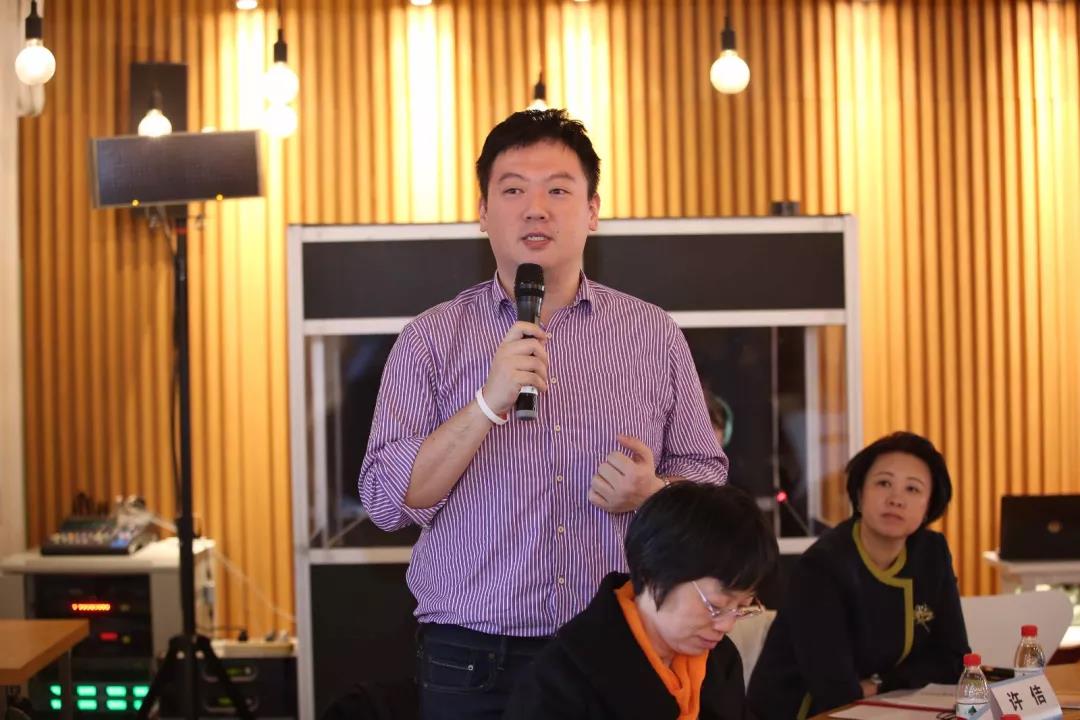
A trainee shares his story
Roleplay: observing business from the perspective of children
Roleplay is one of the highlights of the Workshop. By setting topics, inviting trainees to play the roles so as to guide trainees to observe business from children's perspective, identify the risks and problems of children's rights in specific environment from the statements of different stakeholders, and finally find feasible solutions to the problems.
[Four roles]
• A child who stays with his parents on the construction site
• A parent who leaves his/her children at home while working on the construction site
• A construction manager who has to solve the problem of child labor or children on the construction site
• A mother who lives in the surrounding community and is worried that her daughter starts to take drugs and has an affair with the construction worker
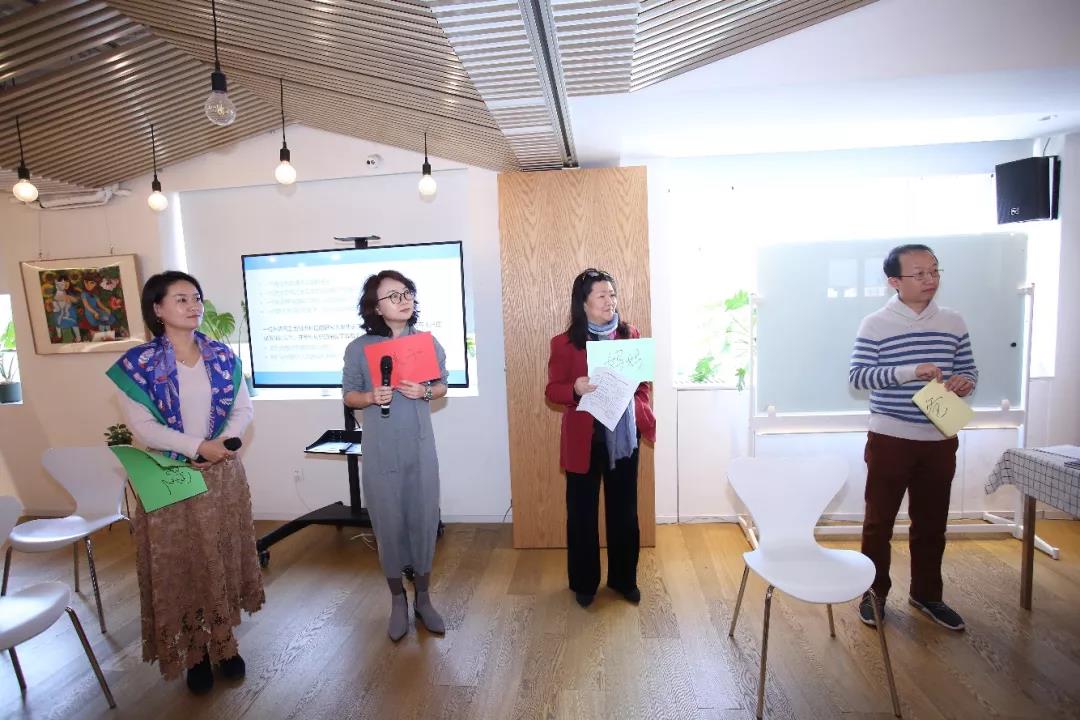
Roleplay
1. Safety and health risk: Due to the special nature of the construction site and limitations of children's judgment on the risks, such as the construction risk of the site, the material risk on the construction site, construction workers’ excessive drinking and drug use and large migrant population, children are faced with the risk of being abducted, sexually assaulted and picking up bad habits in such an environment.
Solutions: A real estate contractor in Thailand created a safe and friendly space for employees’ children with special personnel to take care of them, which solved the employees' concern about their children's safety, health and studying, so that the employees can better serve the enterprise. Now an increasing number of child-friendly cities, businesses, factories and communities have emerged around the world.
2. Use of child labor: Child labor is an important issue in the construction and infrastructure industries, including temporary and young workers recruited from outside. It is an inevitable problem from contractors to subcontractors and to the construction team.
Solutions: Enterprises should fully abide by national laws and ensure that their partners, including contractors, subcontractors and suppliers develop corresponding prevention and monitoring mechanisms and policies to prevent and control child labor. Obeying the law also serves as the most direct protection for children.
Experts' comments
Creating a good environment for construction (working) and friendly environment for surrounding communities are conducive to the development of enterprises. Children's rights not only involve safety, education and growth, but also the growing environment for children. In such circumstance, it is not just parents and construction sites, but also the social security system and the family environment that matter greatly to the children's growth.
Expert View: Building a Child-Friendly Business
Solutions: A real estate contractor in Thailand created a safe and friendly space for employees’ children with special personnel to take care of them, which solved the employees' concern about their children's safety, health and studying, so that the employees can better serve the enterprise. Now an increasing number of child-friendly cities, businesses, factories and communities have emerged around the world.
2. Use of child labor: Child labor is an important issue in the construction and infrastructure industries, including temporary and young workers recruited from outside. It is an inevitable problem from contractors to subcontractors and to the construction team.
Solutions: Enterprises should fully abide by national laws and ensure that their partners, including contractors, subcontractors and suppliers develop corresponding prevention and monitoring mechanisms and policies to prevent and control child labor. Obeying the law also serves as the most direct protection for children.
Experts' comments
Creating a good environment for construction (working) and friendly environment for surrounding communities are conducive to the development of enterprises. Children's rights not only involve safety, education and growth, but also the growing environment for children. In such circumstance, it is not just parents and construction sites, but also the social security system and the family environment that matter greatly to the children's growth.
Expert View: Building a Child-Friendly Business

Sharing by Cheng Jin, Corporate Social Responsibility Specialist, UNICEF China
Ms. Cheng Jin firstly introduced the basic information of UNICEF and its main work in China to the trainees, and then guided them to think deeply and discuss the relationship between children's rights and the daily operation of enterprises.
She believes that: When it comes to the protection of children's rights, we should not just focus on external funding, but shift our mind and pay more attention on whether the concept and measures of children's rights protection have been integrated into the internal operation and planning of enterprises, and observe business from the perspective of children and the maximization of children's rights and interests.
She believes that: When it comes to the protection of children's rights, we should not just focus on external funding, but shift our mind and pay more attention on whether the concept and measures of children's rights protection have been integrated into the internal operation and planning of enterprises, and observe business from the perspective of children and the maximization of children's rights and interests.
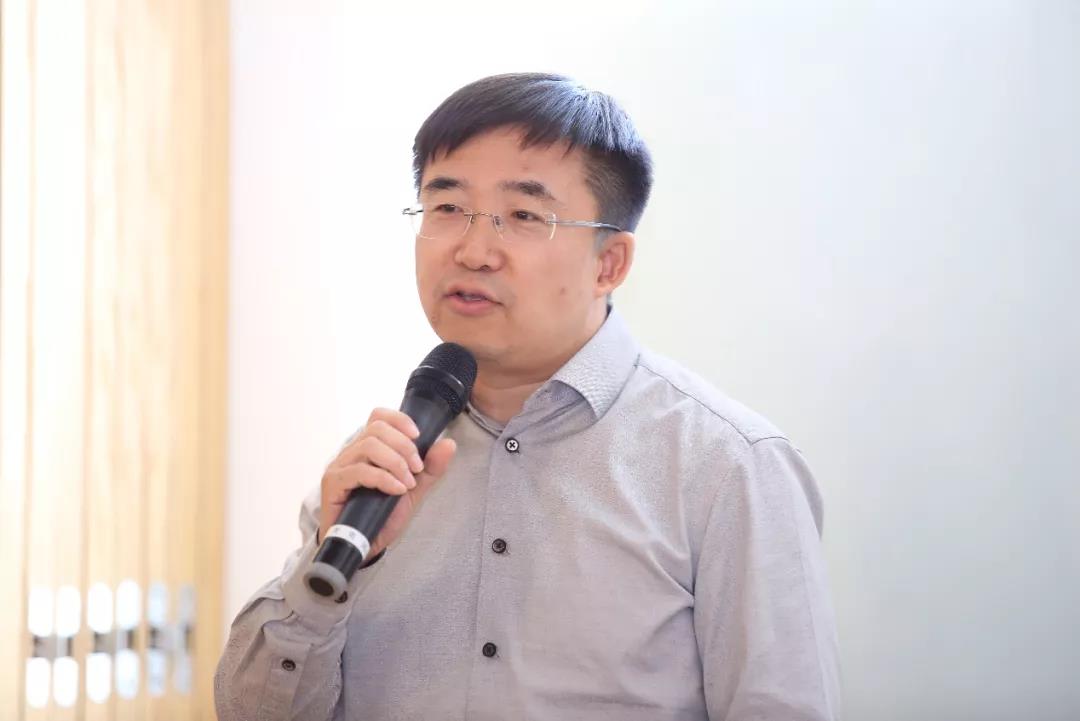
Dr. Liang Xiaohui's interpretation of children's rights protection from the perspective of the textile industry
In particular, the Workshop invited Dr. Liang Xiaohui, (Chief Researcher, Office for Social Responsibility, China National Textile and Apparel Council [CNTAC]) to conduct an in-depth dialogue on the involvement of CNTAC as the only industrial organization in the Children's Rights and Business Principles (CRBP) released in London in 2012. He shared his views on the protection of children's rights from the perspective of the textile industry.
Dr. Liang Xiaohui said that: At present, many enterprises know nothing about CRBP and feel that "It's enough that we don't use child labor!", neglecting the impact on children's rights in the full life cycle of products. An important way to promote CRBP is to increase its visibility in the industry, lead everyone to understand the issues raised by it and obtain the recognition from enterprises. Some basic issues deserve more attention and awareness, such as child labor, the impact of products on children, and the impact of the production environment on children in surrounding areas.
Now the textile industry has two development trends: one is the domestic industry upgrading and transformation, and the other is the shift to making low-end products in countries with lower costs, both of which have a great impact on children. In terms of the overseas development, in addition to the prevention of child labor, the undernutrition of young workers also needs our attention and solution. If these problems are not solved, the productivity and labor skills of these workers will not be improved.
Dr. Liang Xiaohui said that: At present, many enterprises know nothing about CRBP and feel that "It's enough that we don't use child labor!", neglecting the impact on children's rights in the full life cycle of products. An important way to promote CRBP is to increase its visibility in the industry, lead everyone to understand the issues raised by it and obtain the recognition from enterprises. Some basic issues deserve more attention and awareness, such as child labor, the impact of products on children, and the impact of the production environment on children in surrounding areas.
Now the textile industry has two development trends: one is the domestic industry upgrading and transformation, and the other is the shift to making low-end products in countries with lower costs, both of which have a great impact on children. In terms of the overseas development, in addition to the prevention of child labor, the undernutrition of young workers also needs our attention and solution. If these problems are not solved, the productivity and labor skills of these workers will not be improved.
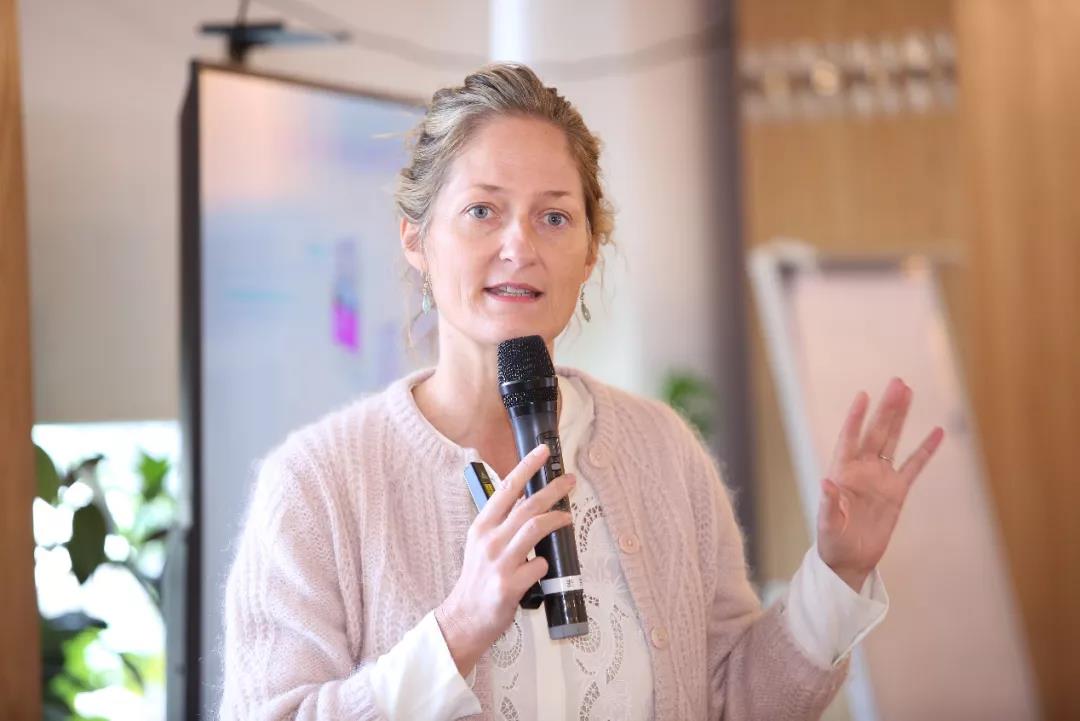
Sharing by Ida Margarita Hyllested, Child Rights and Business Specialist, UNICEF
In order to better advance the "Child-Friendly Business" agenda, Ida, Child Rights and Business Specialist, UNICEF, shared a number of business principles in children's digital rights, responsible marketing and children's rights protection in the cooperation with extractive and financial enterprises, as well as 10 different Tools including Child Safeguarding Toolkit for Business, Children’s Rights in Impact Assessments and Engaging Stakeholders on Children’s Rights.
She called on everyone to turn the Guide into the establishment of a child-friendly business with its information and communicating with stakeholders. She also advocated direct and indirect interaction between enterprises and children to protect them from harm. UNICEF provides platform for children’s development and opportunities to communicate with each other online and offline, and express their demands.
She called on everyone to turn the Guide into the establishment of a child-friendly business with its information and communicating with stakeholders. She also advocated direct and indirect interaction between enterprises and children to protect them from harm. UNICEF provides platform for children’s development and opportunities to communicate with each other online and offline, and express their demands.
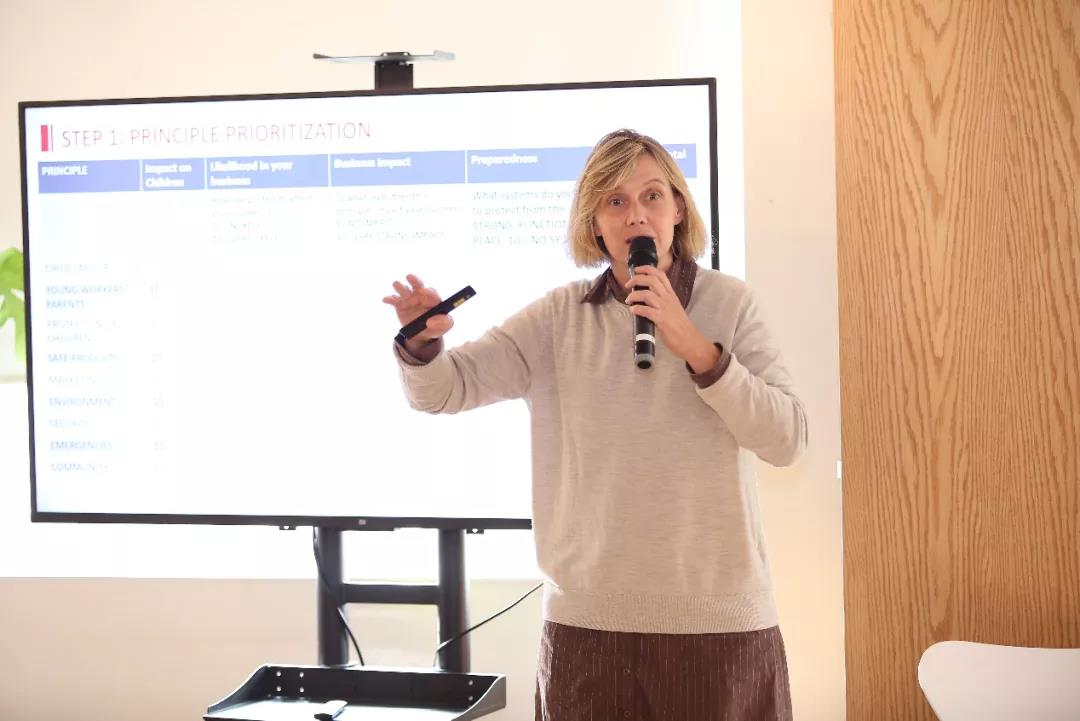
Sharing by Ines Kaempfer, Executive Director at CCR CSR
Ines, Executive Director at CCR CSR, interpreted how to protect children's rights from a global supply chain perspective. She broke down the 10 principles of children's rights and guided enterprises to score themselves according to their development so as to practically evaluate their business practices, make solutions to change and continuously improve, thus helping these enterprises build a child-friendly business.
Ines pointed out that we should not only analyze children's rights, but also the enterprise needs. If a project designed does not meet the needs of the enterprise's development, it will ultimately be unsustainable.
Ines pointed out that we should not only analyze children's rights, but also the enterprise needs. If a project designed does not meet the needs of the enterprise's development, it will ultimately be unsustainable.
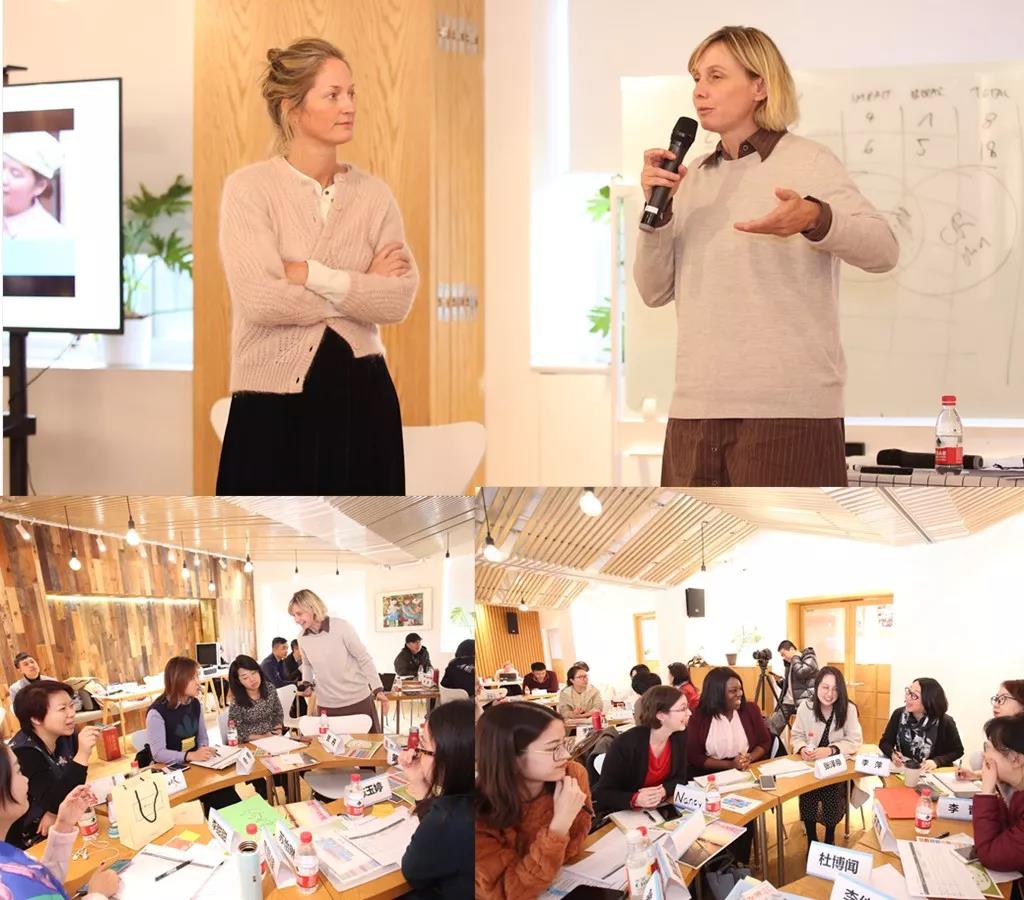
Later, Ida and Ines led the trainees to simulate the mine scenario, guiding them to think independently and then discuss together to come up with a solution to the problems related to the protection of children's rights appeared in the supply chain according to the guide on communication with stakeholders, so that everyone can learn the approaches in a more effective way.
Case sharing: different ways to develop public welfare
In the process of participating in the Belt and Road Initiative, the State Grid has consistently worked to fit in local communities, fulfill its social responsibilities, and promote people-to-people friendship and common understanding.
Mr. Wang Qing, General Manager of Guodian Foreign Affair Service Co., Ltd., took us across the mountains and the seas, telling the story of the Tide of Tomorrow, a Brazilian symphony orchestra. Children in the orchestra, developing from dozens of people to more than two thousand today, perform from small houses in a slum to around the world. This is a microcosm that the State Grid assumes its responsibility overseas. By delivering music, they pay attention to the development of children in slums, and at the same time deliver the care of the State Grid, a Chinese company, for local development around the world.
Case sharing: different ways to develop public welfare
In the process of participating in the Belt and Road Initiative, the State Grid has consistently worked to fit in local communities, fulfill its social responsibilities, and promote people-to-people friendship and common understanding.
Mr. Wang Qing, General Manager of Guodian Foreign Affair Service Co., Ltd., took us across the mountains and the seas, telling the story of the Tide of Tomorrow, a Brazilian symphony orchestra. Children in the orchestra, developing from dozens of people to more than two thousand today, perform from small houses in a slum to around the world. This is a microcosm that the State Grid assumes its responsibility overseas. By delivering music, they pay attention to the development of children in slums, and at the same time deliver the care of the State Grid, a Chinese company, for local development around the world.
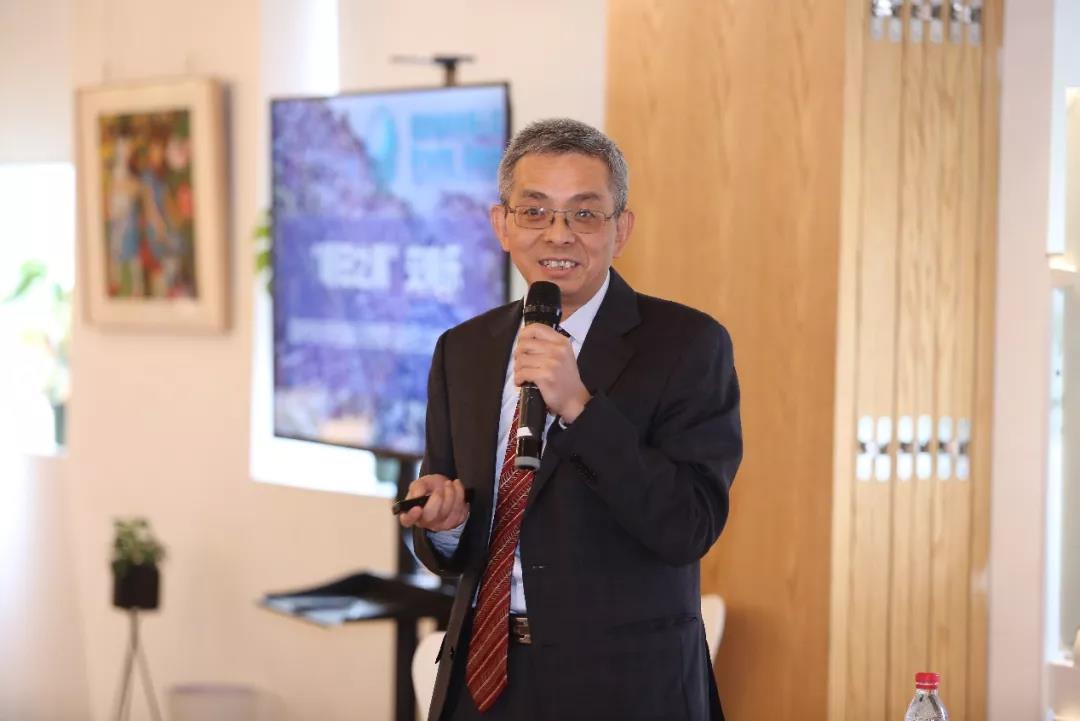
Sharing by Mr. Wang Qing, General Manager of Guodian Foreign Affair Service Co., Ltd.
"The spark in their eyes, the thirst for knowledge, and the awakening of dreams are the best interpretations of the significance of our overseas public welfare undertakings, prompting us to persevere in this responsibility." Head of State Grid Brazil said.
Through a day-long study and communication, everyone felt that we can do better for children. We need to focus more on children, review our own operations from the perspective of the rights and interests of children, and integrate the guide into our daily operation and management; no matter which industry we belong to and which country we are in, we can work for a better future for our children.
Through a day-long study and communication, everyone felt that we can do better for children. We need to focus more on children, review our own operations from the perspective of the rights and interests of children, and integrate the guide into our daily operation and management; no matter which industry we belong to and which country we are in, we can work for a better future for our children.
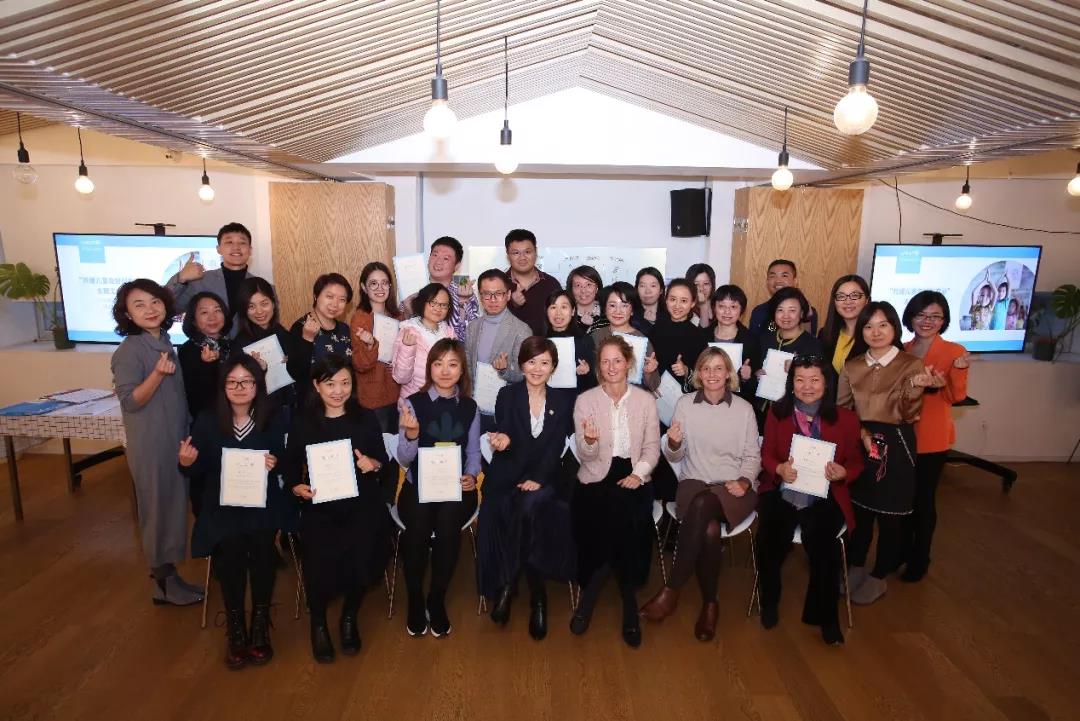
Group Photo of Some Trainees
[About UNICEF]
United Nations International Children's Emergency Fund (UNICEF), founded on December 11, 1946, was originally established to meet the urgent needs of European and Chinese children after the Second World War. Since 1950, its work has expanded to meet the long-term needs of children and mothers in all developing countries around the world. In 1953, UNICEF became a permanent member of the United Nations system and was commissioned by the United Nations General Assembly to work to realize the rights of mothers, infants and children to survive, develop, be protected and participate around the world.
UNICEF's work in China is mainly: committed to promoting the implementation of children's rights by driving policy development and legal protection. The UNICEF China works with the Chinese government and other partners to ensure that the poorest children can also enjoy the dividends of national development. At the same time, UNICEF also shares its experience in projects and research results.
Test answers
1. 1. If a 12-year-old child studies full-time at school, but works in a store owned by his/her family after school, can this be regarded as child labor? (Children refer to minors under the age of 18)
[Answer] No. If the family must rely on the help of children to survive, the right to survive is greater than other rights. Helping at home is actually a way to help the family survive. As long as the child is capable, and such work does not affect his /her physical and mental health and full-time learning, it will not be considered as child labor.
2. Can a 17-year-old teenager working in a mine be regarded as child labor?
[Answer] Yes. Although the child has reached the minimum working age, but still under 18, it is still regarded as child labor because mine is a dangerous place to work.
3. Does the Children's Rights and Business Principles (CRBP) only apply to business activities of the enterprise itself?
[Answer] No. The parties that CRBP applies to include all stakeholders of enterprises, such as the supply chains, partners, and communities.
4. Can an enterprise participate in the Children's Rights and Business Principles (CRBP)?
[Answer] Yes. Enterprises can participate in the formulation and application of CRBP.
5. If an enterprise rents the land due to its operational needs, should the enterprise or the land owner be responsible for the impact on the community where the land is located?
[Answer] The responsibility rests with both parties. Although the enterprise is not the owner of the land, it should also bear the corresponding responsibility after the lease; so, both the land owner and the enterprise should assume this responsibility.
6. We don't produce children related products or provide related services, so the protection of their rights has nothing to do with us.
[Answer] No. Corporate responsibility for children is often thought of as preventing or eradicating child labor. CRBP not only lists the standards and measures necessary to prevent and eradicate child labor, but also highlights various ways in which enterprises may influence children, including the impact of overall business operation, such as the impact arising from their products and services, marketing and distribution approaches, as well as the impact on children through their relationships with national and local governments or investments in local communities. Therefore, children are closely related to the operation of each enterprise which has a direct or indirect impact on children's rights.
7. Is the concern for children's rights the public welfare and charity for children?
[Answer] No. As for paying attention to and supporting children's rights, in addition to respecting children's rights, enterprises should also actively promote children's rights, such as supporting children's rights through their core business, investment with social impact, and strategic public welfare. Some influential leaders may also advocate for public policies on children's rights, and work with business partners and industries to support the practice of children's rights in business.
8. Are only brand owners and advertising companies responsible for advertisements for children?
[Answer] No. In addition to brand owners and advertising companies, it also includes media and technology platforms that place ads.
Best Practices
- The 100-year brand — Air Liquide also has a sense of juvenile
- Beijing Public Transportation Corporation: Developing green transportation to build a harmonious and livable capital
- CGN: Building a modern factory in barren deserts and developing a new win-win cooperation model along “Belt and Road”
Upcoming Event

All the materials on the site “Source: XXX (not from this site)” have been reprinted from other media. They do not imply the agreement by the site.
All the materials with “Source: CSR-China Website” are the copyright of CSR-China Website. None of them may be used in any form or by any means without permission from CSR-China Website.
GoldenBee Official WeChat
Copyright © Csr-china.net All Right Reserved.
京ICP备19010813号










